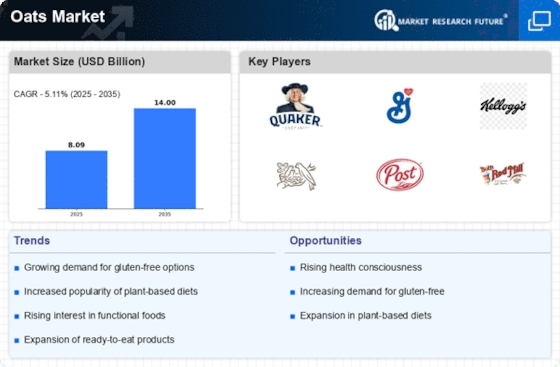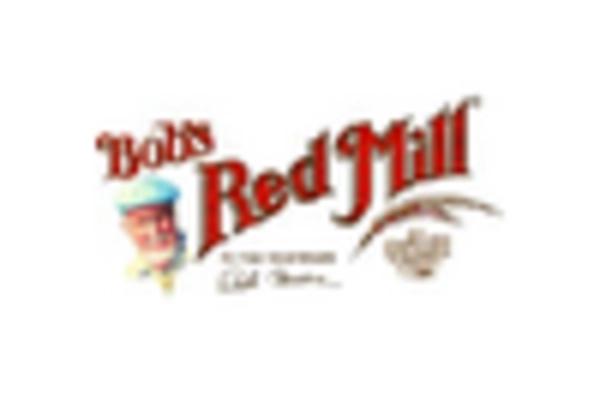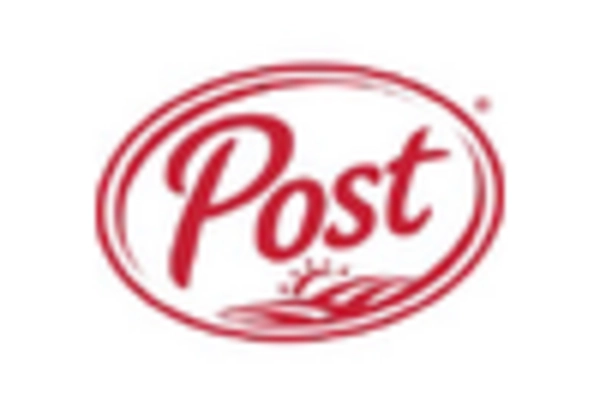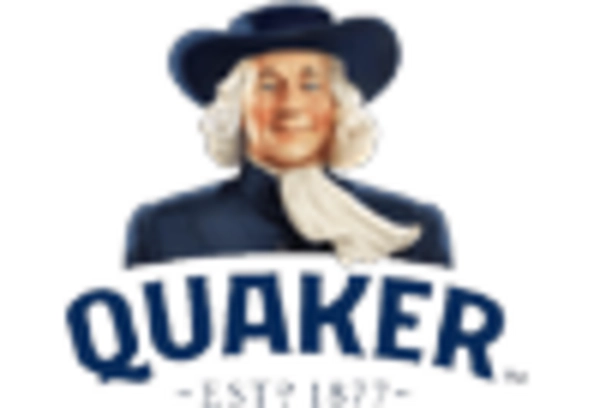Whole Oats
Rolled Oats
Steel-Cut Oats
Instant Oats
Food and Beverage
Animal Feed
Pharmaceuticals
Cosmetics
Granules
Flakes
Powder
Coarse
Household
Food Service
Bakery
Cereal Production
North America
Europe
South America
Asia Pacific
Middle East and Africa
North America Outlook (USD Billion, 2019-2035)
North America Oats Market by Product Type
Whole Oats
Rolled Oats
Steel-Cut Oats
Instant Oats
North America Oats Market by Application Type
Food and Beverage
Animal Feed
Pharmaceuticals
Cosmetics
North America Oats Market by Form Type
Granules
Flakes
Powder
Coarse
North America Oats Market by End Use Type
Household
Food Service
Bakery
Cereal Production
North America Oats Market by Regional Type
US
Canada
US Outlook (USD Billion, 2019-2035)
US Oats Market by Product Type
Whole Oats
Rolled Oats
Steel-Cut Oats
Instant Oats
US Oats Market by Application Type
Food and Beverage
Animal Feed
Pharmaceuticals
Cosmetics
US Oats Market by Form Type
Granules
Flakes
Powder
Coarse
US Oats Market by End Use Type
Household
Food Service
Bakery
Cereal Production
CANADA Outlook (USD Billion, 2019-2035)
CANADA Oats Market by Product Type
Whole Oats
Rolled Oats
Steel-Cut Oats
Instant Oats
CANADA Oats Market by Application Type
Food and Beverage
Animal Feed
Pharmaceuticals
Cosmetics
CANADA Oats Market by Form Type
Granules
Flakes
Powder
Coarse
CANADA Oats Market by End Use Type
Household
Food Service
Bakery
Cereal Production
Europe Outlook (USD Billion, 2019-2035)
Europe Oats Market by Product Type
Whole Oats
Rolled Oats
Steel-Cut Oats
Instant Oats
Europe Oats Market by Application Type
Food and Beverage
Animal Feed
Pharmaceuticals
Cosmetics
Europe Oats Market by Form Type
Granules
Flakes
Powder
Coarse
Europe Oats Market by End Use Type
Household
Food Service
Bakery
Cereal Production
Europe Oats Market by Regional Type
Germany
UK
France
Russia
Italy
Spain
Rest of Europe
GERMANY Outlook (USD Billion, 2019-2035)
GERMANY Oats Market by Product Type
Whole Oats
Rolled Oats
Steel-Cut Oats
Instant Oats
GERMANY Oats Market by Application Type
Food and Beverage
Animal Feed
Pharmaceuticals
Cosmetics
GERMANY Oats Market by Form Type
Granules
Flakes
Powder
Coarse
GERMANY Oats Market by End Use Type
Household
Food Service
Bakery
Cereal Production
UK Outlook (USD Billion, 2019-2035)
UK Oats Market by Product Type
Whole Oats
Rolled Oats
Steel-Cut Oats
Instant Oats
UK Oats Market by Application Type
Food and Beverage
Animal Feed
Pharmaceuticals
Cosmetics
UK Oats Market by Form Type
Granules
Flakes
Powder
Coarse
UK Oats Market by End Use Type
Household
Food Service
Bakery
Cereal Production
FRANCE Outlook (USD Billion, 2019-2035)
FRANCE Oats Market by Product Type
Whole Oats
Rolled Oats
Steel-Cut Oats
Instant Oats
FRANCE Oats Market by Application Type
Food and Beverage
Animal Feed
Pharmaceuticals
Cosmetics
FRANCE Oats Market by Form Type
Granules
Flakes
Powder
Coarse
FRANCE Oats Market by End Use Type
Household
Food Service
Bakery
Cereal Production
RUSSIA Outlook (USD Billion, 2019-2035)
RUSSIA Oats Market by Product Type
Whole Oats
Rolled Oats
Steel-Cut Oats
Instant Oats
RUSSIA Oats Market by Application Type
Food and Beverage
Animal Feed
Pharmaceuticals
Cosmetics
RUSSIA Oats Market by Form Type
Granules
Flakes
Powder
Coarse
RUSSIA Oats Market by End Use Type
Household
Food Service
Bakery
Cereal Production
ITALY Outlook (USD Billion, 2019-2035)
ITALY Oats Market by Product Type
Whole Oats
Rolled Oats
Steel-Cut Oats
Instant Oats
ITALY Oats Market by Application Type
Food and Beverage
Animal Feed
Pharmaceuticals
Cosmetics
ITALY Oats Market by Form Type
Granules
Flakes
Powder
Coarse
ITALY Oats Market by End Use Type
Household
Food Service
Bakery
Cereal Production
SPAIN Outlook (USD Billion, 2019-2035)
SPAIN Oats Market by Product Type
Whole Oats
Rolled Oats
Steel-Cut Oats
Instant Oats
SPAIN Oats Market by Application Type
Food and Beverage
Animal Feed
Pharmaceuticals
Cosmetics
SPAIN Oats Market by Form Type
Granules
Flakes
Powder
Coarse
SPAIN Oats Market by End Use Type
Household
Food Service
Bakery
Cereal Production
REST OF EUROPE Outlook (USD Billion, 2019-2035)
REST OF EUROPE Oats Market by Product Type
Whole Oats
Rolled Oats
Steel-Cut Oats
Instant Oats
REST OF EUROPE Oats Market by Application Type
Food and Beverage
Animal Feed
Pharmaceuticals
Cosmetics
REST OF EUROPE Oats Market by Form Type
Granules
Flakes
Powder
Coarse
REST OF EUROPE Oats Market by End Use Type
Household
Food Service
Bakery
Cereal Production
APAC Outlook (USD Billion, 2019-2035)
APAC Oats Market by Product Type
Whole Oats
Rolled Oats
Steel-Cut Oats
Instant Oats
APAC Oats Market by Application Type
Food and Beverage
Animal Feed
Pharmaceuticals
Cosmetics
APAC Oats Market by Form Type
Granules
Flakes
Powder
Coarse
APAC Oats Market by End Use Type
Household
Food Service
Bakery
Cereal Production
APAC Oats Market by Regional Type
China
India
Japan
South Korea
Malaysia
Thailand
Indonesia
Rest of APAC
CHINA Outlook (USD Billion, 2019-2035)
CHINA Oats Market by Product Type
Whole Oats
Rolled Oats
Steel-Cut Oats
Instant Oats
CHINA Oats Market by Application Type
Food and Beverage
Animal Feed
Pharmaceuticals
Cosmetics
CHINA Oats Market by Form Type
Granules
Flakes
Powder
Coarse
CHINA Oats Market by End Use Type
Household
Food Service
Bakery
Cereal Production
INDIA Outlook (USD Billion, 2019-2035)
INDIA Oats Market by Product Type
Whole Oats
Rolled Oats
Steel-Cut Oats
Instant Oats
INDIA Oats Market by Application Type
Food and Beverage
Animal Feed
Pharmaceuticals
Cosmetics
INDIA Oats Market by Form Type
Granules
Flakes
Powder
Coarse
INDIA Oats Market by End Use Type
Household
Food Service
Bakery
Cereal Production
JAPAN Outlook (USD Billion, 2019-2035)
JAPAN Oats Market by Product Type
Whole Oats
Rolled Oats
Steel-Cut Oats
Instant Oats
JAPAN Oats Market by Application Type
Food and Beverage
Animal Feed
Pharmaceuticals
Cosmetics
JAPAN Oats Market by Form Type
Granules
Flakes
Powder
Coarse
JAPAN Oats Market by End Use Type
Household
Food Service
Bakery
Cereal Production
SOUTH KOREA Outlook (USD Billion, 2019-2035)
SOUTH KOREA Oats Market by Product Type
Whole Oats
Rolled Oats
Steel-Cut Oats
Instant Oats
SOUTH KOREA Oats Market by Application Type
Food and Beverage
Animal Feed
Pharmaceuticals
Cosmetics
SOUTH KOREA Oats Market by Form Type
Granules
Flakes
Powder
Coarse
SOUTH KOREA Oats Market by End Use Type
Household
Food Service
Bakery
Cereal Production
MALAYSIA Outlook (USD Billion, 2019-2035)
MALAYSIA Oats Market by Product Type
Whole Oats
Rolled Oats
Steel-Cut Oats
Instant Oats
MALAYSIA Oats Market by Application Type
Food and Beverage
Animal Feed
Pharmaceuticals
Cosmetics
MALAYSIA Oats Market by Form Type
Granules
Flakes
Powder
Coarse
MALAYSIA Oats Market by End Use Type
Household
Food Service
Bakery
Cereal Production
THAILAND Outlook (USD Billion, 2019-2035)
THAILAND Oats Market by Product Type
Whole Oats
Rolled Oats
Steel-Cut Oats
Instant Oats
THAILAND Oats Market by Application Type
Food and Beverage
Animal Feed
Pharmaceuticals
Cosmetics
THAILAND Oats Market by Form Type
Granules
Flakes
Powder
Coarse
THAILAND Oats Market by End Use Type
Household
Food Service
Bakery
Cereal Production
INDONESIA Outlook (USD Billion, 2019-2035)
INDONESIA Oats Market by Product Type
Whole Oats
Rolled Oats
Steel-Cut Oats
Instant Oats
INDONESIA Oats Market by Application Type
Food and Beverage
Animal Feed
Pharmaceuticals
Cosmetics
INDONESIA Oats Market by Form Type
Granules
Flakes
Powder
Coarse
INDONESIA Oats Market by End Use Type
Household
Food Service
Bakery
Cereal Production
REST OF APAC Outlook (USD Billion, 2019-2035)
REST OF APAC Oats Market by Product Type
Whole Oats
Rolled Oats
Steel-Cut Oats
Instant Oats
REST OF APAC Oats Market by Application Type
Food and Beverage
Animal Feed
Pharmaceuticals
Cosmetics
REST OF APAC Oats Market by Form Type
Granules
Flakes
Powder
Coarse
REST OF APAC Oats Market by End Use Type
Household
Food Service
Bakery
Cereal Production
South America Outlook (USD Billion, 2019-2035)
South America Oats Market by Product Type
Whole Oats
Rolled Oats
Steel-Cut Oats
Instant Oats
South America Oats Market by Application Type
Food and Beverage
Animal Feed
Pharmaceuticals
Cosmetics
South America Oats Market by Form Type
Granules
Flakes
Powder
Coarse
South America Oats Market by End Use Type
Household
Food Service
Bakery
Cereal Production
South America Oats Market by Regional Type
Brazil
Mexico
Argentina
Rest of South America
BRAZIL Outlook (USD Billion, 2019-2035)
BRAZIL Oats Market by Product Type
Whole Oats
Rolled Oats
Steel-Cut Oats
Instant Oats
BRAZIL Oats Market by Application Type
Food and Beverage
Animal Feed
Pharmaceuticals
Cosmetics
BRAZIL Oats Market by Form Type
Granules
Flakes
Powder
Coarse
BRAZIL Oats Market by End Use Type
Household
Food Service
Bakery
Cereal Production
MEXICO Outlook (USD Billion, 2019-2035)
MEXICO Oats Market by Product Type
Whole Oats
Rolled Oats
Steel-Cut Oats
Instant Oats
MEXICO Oats Market by Application Type
Food and Beverage
Animal Feed
Pharmaceuticals
Cosmetics
MEXICO Oats Market by Form Type
Granules
Flakes
Powder
Coarse
MEXICO Oats Market by End Use Type
Household
Food Service
Bakery
Cereal Production
ARGENTINA Outlook (USD Billion, 2019-2035)
ARGENTINA Oats Market by Product Type
Whole Oats
Rolled Oats
Steel-Cut Oats
Instant Oats
ARGENTINA Oats Market by Application Type
Food and Beverage
Animal Feed
Pharmaceuticals
Cosmetics
ARGENTINA Oats Market by Form Type
Granules
Flakes
Powder
Coarse
ARGENTINA Oats Market by End Use Type
Household
Food Service
Bakery
Cereal Production
REST OF SOUTH AMERICA Outlook (USD Billion, 2019-2035)
REST OF SOUTH AMERICA Oats Market by Product Type
Whole Oats
Rolled Oats
Steel-Cut Oats
Instant Oats
REST OF SOUTH AMERICA Oats Market by Application Type
Food and Beverage
Animal Feed
Pharmaceuticals
Cosmetics
REST OF SOUTH AMERICA Oats Market by Form Type
Granules
Flakes
Powder
Coarse
REST OF SOUTH AMERICA Oats Market by End Use Type
Household
Food Service
Bakery
Cereal Production
MEA Outlook (USD Billion, 2019-2035)
MEA Oats Market by Product Type
Whole Oats
Rolled Oats
Steel-Cut Oats
Instant Oats
MEA Oats Market by Application Type
Food and Beverage
Animal Feed
Pharmaceuticals
Cosmetics
MEA Oats Market by Form Type
Granules
Flakes
Powder
Coarse
MEA Oats Market by End Use Type
Household
Food Service
Bakery
Cereal Production
MEA Oats Market by Regional Type
GCC Countries
South Africa
Rest of MEA
GCC COUNTRIES Outlook (USD Billion, 2019-2035)
GCC COUNTRIES Oats Market by Product Type
Whole Oats
Rolled Oats
Steel-Cut Oats
Instant Oats
GCC COUNTRIES Oats Market by Application Type
Food and Beverage
Animal Feed
Pharmaceuticals
Cosmetics
GCC COUNTRIES Oats Market by Form Type
Granules
Flakes
Powder
Coarse
GCC COUNTRIES Oats Market by End Use Type
Household
Food Service
Bakery
Cereal Production
SOUTH AFRICA Outlook (USD Billion, 2019-2035)
SOUTH AFRICA Oats Market by Product Type
Whole Oats
Rolled Oats
Steel-Cut Oats
Instant Oats
SOUTH AFRICA Oats Market by Application Type
Food and Beverage
Animal Feed
Pharmaceuticals
Cosmetics
SOUTH AFRICA Oats Market by Form Type
Granules
Flakes
Powder
Coarse
SOUTH AFRICA Oats Market by End Use Type
Household
Food Service
Bakery
Cereal Production
REST OF MEA Outlook (USD Billion, 2019-2035)
REST OF MEA Oats Market by Product Type
Whole Oats
Rolled Oats
Steel-Cut Oats
Instant Oats
REST OF MEA Oats Market by Application Type
Food and Beverage
Animal Feed
Pharmaceuticals
Cosmetics
REST OF MEA Oats Market by Form Type
Granules
Flakes
Powder
Coarse
REST OF MEA Oats Market by End Use Type
Household
Food Service
Bakery
Cereal Production


















Leave a Comment